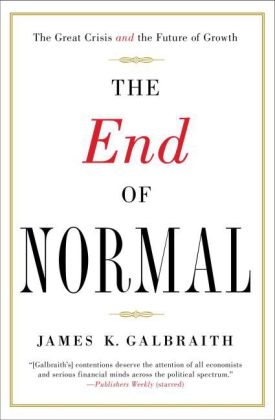
The End of Normal
The Great Crisis and the Future of Growth
Seiten
2015
Simon & Schuster (Verlag)
978-1-4516-4493-7 (ISBN)
Simon & Schuster (Verlag)
978-1-4516-4493-7 (ISBN)
- Titel z.Zt. nicht lieferbar
- Versandkostenfrei innerhalb Deutschlands
- Auch auf Rechnung
- Verfügbarkeit in der Filiale vor Ort prüfen
- Artikel merken
From respected thinker and economic iconoclast James K. Galbraith, a smart, scathing explanation for the economic crisis, and a vision for the future
From one of the most respected economic thinkers and writers of our time, a brilliant argument about the history and future of economic growth.
The years since the Great Crisis of 2008 have seen slow growth, high unemployment, falling home values, chronic deficits, a deepening disaster in Europe and a stale argument between two false solutions, "austerity" on one side and "stimulus" on the other. Both sides and practically all analyses of the crisis so far take for granted that the economic growth from the early 1950s until 2000 interrupted only by the troubled 1970s-represented a normal performance. From this perspective, the crisis was an interruption, caused by bad policy or bad people, and full recovery is to be expected if the cause is corrected.
The End of Normalchallenges this view. Placing the crisis in perspective, Galbraith argues that the 1970s already ended the age of easy growth. The 1980s and 1990s saw only uneven growth, with rising inequality within and between countries. And the 2000s saw the end even of that, despite frantic efforts to keep growth going with tax cuts, war spending and financial deregulation. When the crisis finally came, stimulus and automatic stabilization were able to place a floor under economic collapse. But they are not able to bring about a return to high growth and full employment. In The End of Normal, "Galbraith puts his pessimism into an engaging, plausible frame. His contentions deserve the attention of all economists and serious financial minds across the political spectrum" (Publishers Weekly).
From one of the most respected economic thinkers and writers of our time, a brilliant argument about the history and future of economic growth.
The years since the Great Crisis of 2008 have seen slow growth, high unemployment, falling home values, chronic deficits, a deepening disaster in Europe and a stale argument between two false solutions, "austerity" on one side and "stimulus" on the other. Both sides and practically all analyses of the crisis so far take for granted that the economic growth from the early 1950s until 2000 interrupted only by the troubled 1970s-represented a normal performance. From this perspective, the crisis was an interruption, caused by bad policy or bad people, and full recovery is to be expected if the cause is corrected.
The End of Normalchallenges this view. Placing the crisis in perspective, Galbraith argues that the 1970s already ended the age of easy growth. The 1980s and 1990s saw only uneven growth, with rising inequality within and between countries. And the 2000s saw the end even of that, despite frantic efforts to keep growth going with tax cuts, war spending and financial deregulation. When the crisis finally came, stimulus and automatic stabilization were able to place a floor under economic collapse. But they are not able to bring about a return to high growth and full employment. In The End of Normal, "Galbraith puts his pessimism into an engaging, plausible frame. His contentions deserve the attention of all economists and serious financial minds across the political spectrum" (Publishers Weekly).
James K. Galbraith holds the Lloyd M. Bentsen Jr. Chair in Government/Business Relations at the Lyndon B. Johnson School of Public Affairs at the University of Texas at Austin. He lives in Austin, Texas. The End of Normal is his first book.
| Erscheint lt. Verlag | 5.11.2015 |
|---|---|
| Verlagsort | New York |
| Sprache | englisch |
| Maße | 140 x 213 mm |
| Gewicht | 259 g |
| Themenwelt | Sachbuch/Ratgeber ► Beruf / Finanzen / Recht / Wirtschaft ► Wirtschaft |
| Geschichte ► Teilgebiete der Geschichte ► Wirtschaftsgeschichte | |
| Sozialwissenschaften ► Politik / Verwaltung ► Staat / Verwaltung | |
| Wirtschaft ► Volkswirtschaftslehre ► Finanzwissenschaft | |
| Wirtschaft ► Volkswirtschaftslehre ► Makroökonomie | |
| ISBN-10 | 1-4516-4493-0 / 1451644930 |
| ISBN-13 | 978-1-4516-4493-7 / 9781451644937 |
| Zustand | Neuware |
| Haben Sie eine Frage zum Produkt? |
Mehr entdecken
aus dem Bereich
aus dem Bereich
Buch | Hardcover (2012)
Westermann Schulbuchverlag
34,95 €
Schulbuch Klassen 7/8 (G9)
Buch | Hardcover (2015)
Klett (Verlag)
30,50 €
Buch | Softcover (2004)
Cornelsen Verlag
25,25 €


